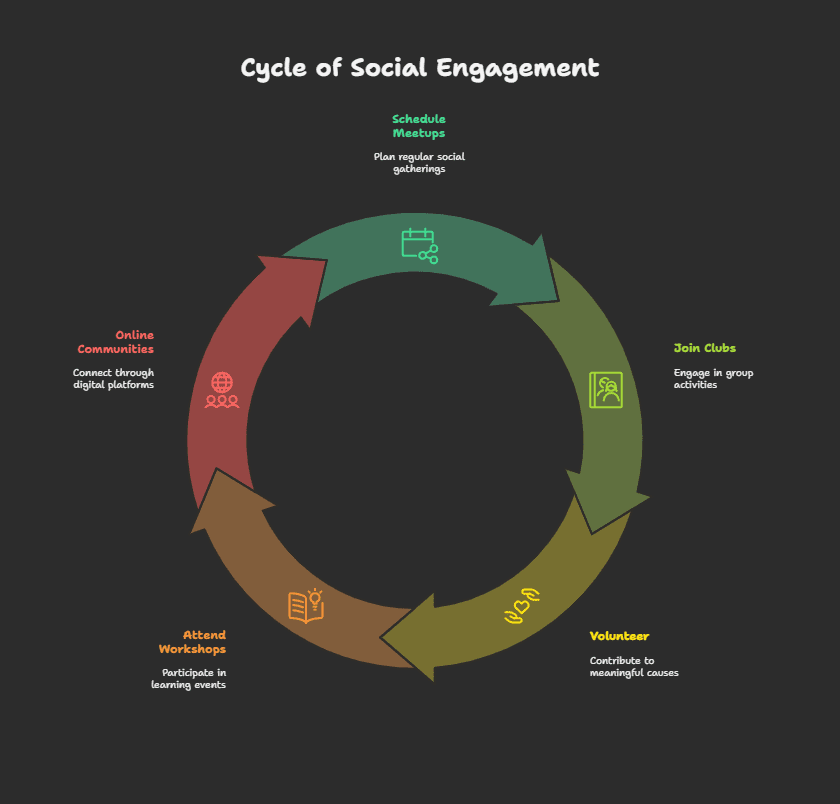In today’s fast-paced digital world, it’s easy to underestimate the deep influence of human interaction on our mental health. However, socializing is serious brain training, providing ample cognitive advantages that transcend conventional mental exercises. Having substantial conversations and being well-connected with others enhances our lives emotionally and strengthens our brains against cognitive loss. Let’s explore how the magic of connection can boost our cognitive well-being.
The Cognitive Workout: How Socializing Engages the Brain
Social interactions are intricate processes that engage several brain areas at once. When we talk, we listen, read non-verbal signals, generate responses, and empathize, all in the moment. This active engagement exercises areas for memory, attention, language, and emotion regulation
According to experts, social activities engage all our senses and require us to process facial expressions, body language, tone of voice, and speech content. This comprehensive brain engagement strengthens neural connections and fosters the creation of new ones, enhancing cognitive resilience.
Building Cognitive Reserve Through Social Engagement
The concept of “cognitive reserve” refers to the brain’s ability to improvise and find alternative ways of completing tasks when faced with challenges. Regular social interaction contributes significantly to building this reserve. Engaging in conversations, participating in group activities, and forming relationships provide mental stimulation that enhances our brain’s adaptability.
Research has shown that people with active social lives are less likely to develop dementia. The study indicates that social interactions challenge and reinforce neural networks, thus postponing cognitive decline.
Emotional Benefits: Stress Reduction and Mood Enhancement
In addition to mental stimulation, socializing is also important for emotional health. Positive social interactions release oxytocin, a hormone that lowers stress and enhances feelings of trust and bonding. This hormonal reaction decreases cortisol levels, counteracting the damaging effects of chronic stress on the brain.
In addition, social interaction can reduce loneliness and depression. Older adults with robust social support networks have better sleep quality and enhanced stress management, both of which are crucial for cognitive health.
Improving Memory and Learning Through Interaction
Socializing is not merely about emotional support; it’s also a very effective memory builder and learning aid. Having a conversation involves recalling facts, speaking them out, and digesting new concepts, all of which build on memory paths.
Scientific studies prove that social contacts increase memory retrieval as well as improve cognitive performance. For example, older persons taking part in recurrent video dialogues demonstrated stronger connectivity in regions of the brain relevant to attention and, hence, reinforced attention capacities.
Socializing Across the Lifespan: A Lifelong Brain Booster
The intellectual advantages of social interaction are not limited to any stage of life. Through childhood into old age, holding on to social relationships promotes brain health.
- Children and Adolescents: Social play and interactions with friends are essential to the development of communication skills, empathy, and problem-solving skills.
- Adults: Keeping work, family, and social life in balance may prove trying, yet keeping up friendships and participating in community activities offer mental stimulation and stress reduction.
- Older Adults: Staying socially engaged can slow down cognitive decline and lower the risk of dementia. Being part of group activities, volunteering, or even just keeping in touch with friends and family regularly can make a big difference.
Practical Tips toPractical Tips to Incorporate Socializing into Daily Life

Incorporating social activities into your daily life doesn’t have to be done with grand gestures. Here are some practical tips to stay socially engaged:
Participate in Online Communities: Although face-to-face interactions are best, social media and online communities can provide significant connections, too.
Schedule Regular Meetups: Allocate time every week to meet up with friends or relatives, either in person or online.
Join Clubs or Groups: Engage in book clubs, hobby clubs, or community groups that interest you.
Volunteer: Volunteering your time for causes that matter to you can bond you with similar individuals.
Attend Workshops or Classes: Opportunities for lifelong learning bring both educational and social rewards.
Conclusion: Adopt Social Interaction for Cognitive Vigor
Adding social interaction to your routine is more than a hobby; it’s a critical part of cognitive well-being. By using your brain with engaging conversations and nurturing strong relationships, you challenge your brain, create cognitive reserve, and feel better emotionally. Don’t forget, socializing is serious mental exercise, and spending time in relationships is a bet on mental fitness









Now a days people are socializing very rare
For introvert even single person to talk is called socializing 😊
Yeah
😄 😄